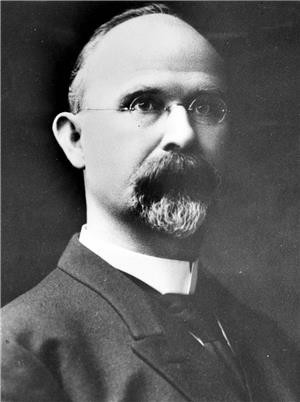On March 8, 1892, Seattle voters elect Democrat James T. Ronald mayor by a wide margin. Ronald serves one two-year term, which he later describes as the most unhappy years of his life. Nevertheless, he makes a key appointment during his time in office when he appoints Reginald Thomson (1856-1949) city engineer. In 1909, Ronald will begin a storied, 40-year career as a judge on the King County Superior Court.
Beginnings
James Theodore Ronald was born April 8, 1855, in Caledonia, Missouri, a small town in eastern Missouri on the edge of the Ozark Mountains. He attended college at the North Missouri Normal School (now [2020] Truman State University), a teacher's school. After graduation in 1875, he moved to California and worked as a teacher. He married Rhoda Margaret Coe (1857-1923) in 1877, and they had three daughters: Norma (1879-1980), Eva (1883-1980), and Mabel (1885-1963).
Ronald soon began studying law. He passed the California bar examination in 1882, and in July of that year moved to Seattle with his growing family. He was appointed a deputy prosecuting attorney in 1883 and became so well-known for his aggressive prosecution of vice cases that he was elected district attorney for King, Kitsap, and Snohomish counties late the following year. He served in this position until 1889. Afterward, he formed a law firm in Seattle with Samuel Piles (1858-1940), who later served a term as a United States Senator from Washington.
A Long Two Years
Ronald was elected mayor of Seattle on March 8, 1892, beating his three opponents by more than 1,000 votes of their combined total, and was sworn in on March 21. During the campaign he had promised that his first act would be to fire the chief of police, who he believed was accepting kickbacks from Seattle's gambling halls and brothels. Ronald later wrote in a memoir that shortly after he was sworn in, the chief (who perhaps had assumed Ronald was merely pontificating) offered him a cut of the take. Ronald fired him in response.
This did not go unnoticed by Seattle's vice community. Days later, employees of John Considine's People's Theater paraded through downtown Seattle, hawking a variety show at the theater. The parade included "a line of open carriages in which were seated bold and painted women, who brazenly returned the stares of the on-lookers," the Seattle Post-Intelligencer indignantly reported the following morning under an equally indignant headline, "A Disgusting Exhibition." The theater, commonly known as a "box house," featured live acts as well as liquor and gambling, and many of its waitresses offered personal services on the side which often were provided in small rooms that lined the interior walls of the theater. The message was clear, but Ronald wasn't intimidated.
However, he had more problems than with just the vice community. Criticism in the press and partisan sniping were constant problems in a city that was less friendly for Democrats than it would be a century later; even Ronald's recommendation that the city expand its nascent parks system was rejected by the city council. The financial panic of 1893 struck midway in his term, crippling both the city and the country. Further, there were accusations of incompetence in the mayor's administration and allegations of corruption, though not against Ronald personally.
His term did have an especially bright moment, and it came when Ronald appointed Reginald Thomson -- a lifelong Republican -- city engineer. Thomson was instrumental in designing the Cedar River water system, which has provided Seattle with water since 1901. He added sewer lines in the city, designed the City Light Cedar Falls hydroelectric plant, and was instrumental in regrading the hills of downtown Seattle. "[He] probably did more than any other individual to change the face of Seattle," wrote historian Alan Stein in a HistoryLink biography about Thomson.
An Accomplished Jurist
The Freeholders Charter of 1890 prohibited Ronald from seeking reelection in 1894, and his term ended on March 19. This was fine with Ronald, who wouldn't have run anyway. He was an unsuccessful candidate for Congress in 1900, but he continued to enjoy success as a practicing attorney. In 1898 he partnered with a firm that included R. A. Ballinger (1858-1922), who served as mayor of Seattle from 1904 to 1906 and later was Secretary of the Interior under President William Howard Taft (1857-1930).
In 1909, Ronald was appointed to serve as a King County Superior Court judge. He sat on the bench for precisely 40 years, and he's remembered more for his accomplished tenure on the bench than he is for his brief tenure as Seattle's mayor. His humor and judicial prowess became legendary, and in his obituary, The Seattle Times added, "a deeply religious man, [Ronald's] decisions were often marked by expressions of optimistic philosophy" ("J.T. Ronald ...").
Ronald died on December 27, 1950, in his apartment at the Exeter Hotel in Seattle. For many years he and his family lived in a neoclassical mansion in Seattle's Leschi neighborhood, and the house, now known as the Judge James T. Ronald House, is listed in the National Register of Historic Places. He also owned property in what later became the city of Shoreline, and a number of landmarks in the city, such as the Ronald Wastewater District and the Ronald United Methodist Church, bear his name.

